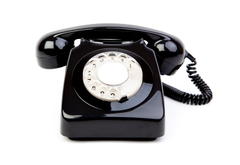 A telephone interview is usually short, just enough time to rule you in or out, so the focus is on questions that help evaluate you quickly. Your goal is to turn it into a face-to-face meeting, so your answers need to be concise. As a rule of thumb, keep your answers to less than two minutes, if an interviewer wants to know more s/he will ask.
A telephone interview is usually short, just enough time to rule you in or out, so the focus is on questions that help evaluate you quickly. Your goal is to turn it into a face-to-face meeting, so your answers need to be concise. As a rule of thumb, keep your answers to less than two minutes, if an interviewer wants to know more s/he will ask.
“Tell me a little about yourself,” is often the first question. Interviewers don’t want your life story; they want to know if meeting you would be a good use of their time. Answer with a brief work history showing how each project and job helped prepare you for this job; then give a profile of the “professional you” addressing your skills as they relate to doing this job well.
“What experience do you have in…?” Make any discussion of your experience relevant to this job, and the specific skills you bring to executing it well. At its core, everything you do professionally is concerned with the identification, prevention and solution of problems within your area of responsibility. Your answers can show this awareness by saying that this is always part of your thinking and by giving examples of preventing or solving problems common to your area of responsibility.
“What are your strengths?” Slant your answer toward the specific skill requirements of the job, your problem prevention and solution headset, and your possession of the transferable professional skills such as Multi-tasking, Critical Thinking, and the eight Communication skills (see any knockemdead.com) that underlie success in every job.
“What are your weaknesses?” You can safely, and honestly, say that your greatest weakness is finding time to stay current with all the new technologies/skills required in your work, because it’s a challenge everyone experiences. Then you give an example(s) of how you have made time to develop an in-demand new skill.
“How much do you want?” If the interviewer asks about money, say that at this point you don’t know enough about the company or the job to answer accurately, “I have no real understanding of the job, your company or the different benefits that could come from joining your team, so obviously my discussion of salary without this knowledge can’t be entirely accurate. However, after analysis of employment sites, salary calculators and talking with colleagues, I would be looking at something in the range of $XX,000 – $YYY,000.”
The telephone interview comes to an end when you are asked whether you have any questions. If you have not already been invited to meet the interviewer, now is the time to take the initiative, “The most pressing question I have is when can we meet?”
In closing your conversation, take care to ascertain the correct spelling and pronunciation of the interviewer’s name, for your follow-up email.
Reprinted with Permission from Simply Hired Blog
Related to Five Killer Interview Questions:
- Passing the telephone screening interview
- Does Your Resume Sell Your Key Skills?
- The Weakness Question



